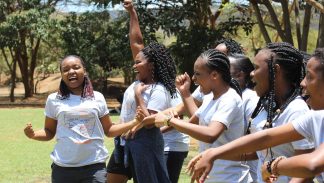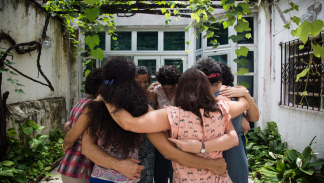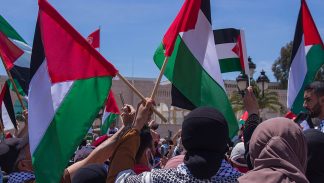Cyclone Idai: Standing in Solidarity with the Feminists Driving Recovery Efforts
Tropical Cyclone Idai rampaged through Mozambique, Malawi, Zimbabwe, and Zambia last month, washing away homes, bridges, schools, and entire neighborhoods. The flooding created inland “oceans” and has been described as one of the worst disasters ever to strike the southern hemisphere. Overall, more than a thousand people have been killed and hundreds of thousands are in need of aid. The World Bank estimates the region will need over $2 billion to recover, and less than a fourth of needed recovery funds have cycled to the region.
Disasters have long-lasting consequences beyond the immediate environmental and physical destruction. The damage to water and sanitation systems from Idai have put families at risk of water- and food-borne diseases. As a result, a cholera epidemic is currently surging. The UN called the event the worst climate disaster in two decades, hitting a region already facing drought and unpredictable growing seasons. Crops have been washed out by the cyclone and farming land is now covered in water.
Recovery efforts must take a long view. Responses should focus on not only immediate emergency response, but lasting recovery led by the most affected communities themselves.
Women and girls are the most affected by Idai
Women, girls, LBTQI, and gender non-conforming people are among the hardest hit in Idai’s aftermath. These groups are facing increased sexual violence, unsafe labor, and an inability to reach medical centers.
It is estimated that nearly half a million women – including over 75,000 pregnant women – were affected by Cyclone Idai. According to Urgent Action Fund Africa, 45,000 births are expected over the next six months, 7,000 of which are at risk of life-threatening complications due to the disaster. More broadly, disasters interrupt access to contraception and other vital reproductive and sexual health services.
Women’s needs must be met – further, their voices must lead recovery efforts.
Global Fund for Women puts funding directly in the hands of women leaders
Global Fund for Women is working with feminist organizations in affected communities. Our participatory approach puts funding directly in the hands of women leaders. We work to ensure that women and girls have the funding and support to design and implement solutions that meet their particular needs.
In the near term, our partners are providing relief supplies for women and girls (including sanitary supplies, clean underwear, and clothing and milk for babies), and are assisting in relocating families whose homes and livelihoods have been destroyed. One partner has begun collaborating with local therapists to provide psycho-social support to affected communities, needs which are critical both immediately and in the longer term.
For long-term responses, partners are advocating for disaster readiness that integrates a gender lens, including better protection of women and girls in camps or in disaster situations. One of our partners is providing information on prevention and management of gender-based violence. Another partner is working to provide sexual and reproductive health services.
As is our practice in response to crisis, Global Fund for Women will provide multi-year funding support to our partners to be responsive to longer-term recovery needs and to support women’s leadership roles during post-disaster recovery.


